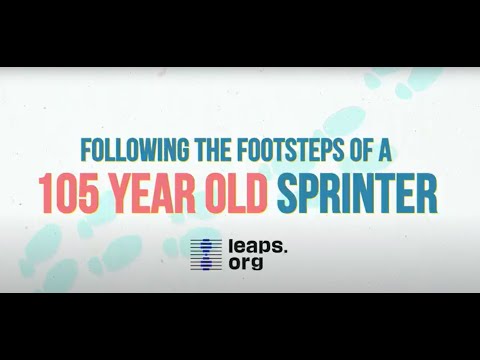Yes, weight and exercise. I seriously doubt he was eating the healthiest of foods and probably took “his fair share of abuse”
from various illicit substances.
He’s always stayed thin, whether from drugs, running (yes, he did run at one point), or nightly performances. His skin looks bad, but his fitness seems excellent. He had a heart valve procedure in 2019.
Harvard, too conservative in their estimates:
The 105 Year Old Sprinter
No human has run a distance of 100 meters faster than Usain Bolt’s lightning streak in 2009. He set this record at age 22. But what will Bolt’s time be when he’s 105?
At the Louisiana Senior Games in November 2021, 105-year-old Julia Hawkins of Baton Rouge became the oldest woman to run 100 meters in an official competition, qualifying her for this year’s National Senior Games. Perhaps not surprisingly, she was the only competitor in the race for people 105 and older. In this Leaps.org video, I interview Hawkins about her lifestyle habits over the decades. Then I ask Steven Austad, a pioneer in studying the mechanisms of aging, for his scientific insights into how those aspiring to become super-agers might follow in Hawkins’ remarkable footsteps.
Those are some disturbing, and hard to believe, charts. I do 600 to 700 minutes (10 to 12 hours) of exercise per week (BJJ five days per week plus supplemental strength and cardio). My son does about 25 hours per week (gymnastics). I have a very hard time believing that 40 minutes per week is superior for all-cause mortality.
I agree with you @MAC in re keto and performance. I went keto about two years ago when my wife got cancer (to eat same as her). For the first six months I was super strict and added in one 72 hr fast per month for those 6 months. The next year I was on a modified keto diet, basically adding fruit (especially berries), but by then I could stay in light ketosis despite the fruit. For the past six months I’m a lot more flexible, because I have the metabolic flexibility to go in and out of ketosis very quickly.
Throughout that period I’ve exercised right on the limit of overtraining in a sport that uses all the energy systems. I found that keto, even strict keto, didn’t interfere with my overall endurance or heavy lifts on supplemental strength days. It did, however, blunt max power output. So I could do a 2 hour BJJ class, including an hour of rolling, so long as I didn’t try to become very explosive. “Sprinting” type behaviour hit a very noticeable wall.
But having gone through the strict keto phase has been very good for my body’s ability to shift between fuel sources. Saturdays I do a class that’s noon to 1.30pm, but we regularly stay and spar until 2 or 3pm. I always do it fasted, and feel no bonk at all. Pre-keto, I’d burn through my muscle glycogen and bonk around 2pm.
My current view based on my n=1 is that keto may be suboptimal for actual performance days, but training your body to effortlessly shift fuel sources through periodic months of keto substantially helps performance long term. And I certainly look and feel better.
Nothing new here, she’s simply a marvellous n=1. Strongly disagree with the narrators premise longevity in the VERY long lived is only 25% genetics. Identical twin studies shows this is false…it’s far higher % in the truly long lived tail. But nothing we can do about genes…yet.
I can’t dispute your premise that genes have very little to do with longevity, but it is indisputable that those born with Down’s Syndrome, etc., have much shorter lives.
My personal belief based on my own (n=1) observations of relatives neighbors etc., is that longevity seems to run in certain families. In my case genealogy give a strong indication that longevity runs on certain sides of the family tree.
Exact opposite, sorry if I was not clear! They have HUGE influence on longevity, both in studies to date, and emerging full genome sequencing of long lived individuals.
Sorry for the misunderstanding, but my own quick search on Google Scholar didn’t bring up much evidence to support genes and longevity. Perhaps I used the wrong search term.
That is why I posted my personal observation that they do.
Genetic influence on human lifespan and longevity https://www.demogr.mpg.de/publications/files/2942_1202133488_1_fulltext.pdf
“Starting from around age 60, the relative recurrence risk increases with increasing survived age for both male and female twins and is higher for MZ twins than DZ twins. Also, power for detecting this difference in recurrence risk increases at this age range as individuals die. Furthermore, the diffference in relative recurrence risk between MZ twins and DZ twins in Table 3 increases with age from age 60 and onwards indicating survival advantage with age due to genetic effects in both males and females.”
Though i think the answer is different for centenarians…
The tree also yielded a new estimate for how much of our life span is determined by genes: just 16%, compared with an estimate of about 25% from studies of twins in Scandinavia. (Like the tree, the twin studies don’t directly analyze DNA, only life spans and relationships.) The lower heritability figure suggests that longevity has even more to do with environment and behavior than had been thought, the team reports today in Science.
Scandinavia’s peaceful history may give genetics a larger role there, says Kaare Christensen, who heads the Danish Twin Registry in Odense, Denmark. But, he notes that twin studies also lack the power of the new study. The new study’s lower figure of 16% suggests that for researchers hunting for longevity genes, “It might be slightly more difficult than we thought,” he says.
The oldest old (centenarian) in some Sardinian towns can all be traced back to 5 families (Longo)
I agree, I think there is much stronger heritability signal in centenarians; a significant body of compelling data. In addition, GWAS whole genome sequencing is starting to tease out some of the unique genes that provide this lifespan extension, for example DNA repair and CVD protective, are just two.
They probably pass down their longevity habits from generation to generation. Is it the genes or the habits?
There’s some merit in this thinking as confounder, for example, in monozygotic twins sharing similar socio-economic signals.
In the Sardinian or Okinawans example, I don’t think that reaches the same confounding threshold. In these relatively meagre historically agricultural centric cultures, everyone experienced by in large very similar dietary, familial, work, religious, values, social interactions.
All I know is there isn’t centenarian in my lineage, so I need to work my butt off! A couple of aunts and paternal grandfather escaped into early 90.
Doing well? You win for THE understatement of the day!
Look at the muscles on that centenarian…phenomenal.
Amazing how a death scare radically changed his mindset (colorectal cancer at 69). You see this so often.
“Turned to a plant-based diet. The tumor shrank over the next two years and finally I killed it by diet alone”
That’s pretty out of the box dietary intervention for back then. Hmmm…low protein yet again. Someone must have told him animal protein = colorectal cancer and he got the memo.
Here’s a recent n=1, metastatic cancer, put on strict keto diet…tumours SHRUNK.
“The KD was administered as a complementary alternative therapy in an attempt to stabilize disease progression. The above beneficial effect of the KD is also supported by the fact that no effect on the disease course was observed throughout the latest period when the patient was receiving conventional therapy. It is important to mention that the low-normal glucose levels could have also contributed in part to the restricted tumor growth in our patient. Previous studies in mice and humans with brain cancer have shown that low blood glucose levels are associated with reduced brain tumor growth rate and better survival, while elevated glucose or hyperglycemia contributes to rapid tumor growth and poor patient survival. Elevated blood glucose is also a risk factor for breast cancer and NSCLC. It is likely that the combination of both reduced glucose levels and elevated ketone levels contributed to tumor management, as described previously. Another interesting point is the lipidemic profile of the patient. The patient developed dyslipidemia only after 10 years on the 3:1 KD without evidence of tumor recurrence. At first glance, this observation could be correlated to the fact that the tumor was no longer active”
Exercise and low protein…and maybe of course, he has some other protective genes.
It kind of makes sense that keto would have a positive effect on cancer. Cancer gets its energy by fermenting glucose. So, deriving your energy from other sources other than glucose should stymie/starve cancer. At least that’s my understanding, but I’m not a doctor.
Ketogenic diet in the treatment of cancer - Where do we stand? - PubMed.
BINGO. Starving the cancer of its metabolic fuel…anti-Warburg. It doesn’t have the transporters to process ketones.


